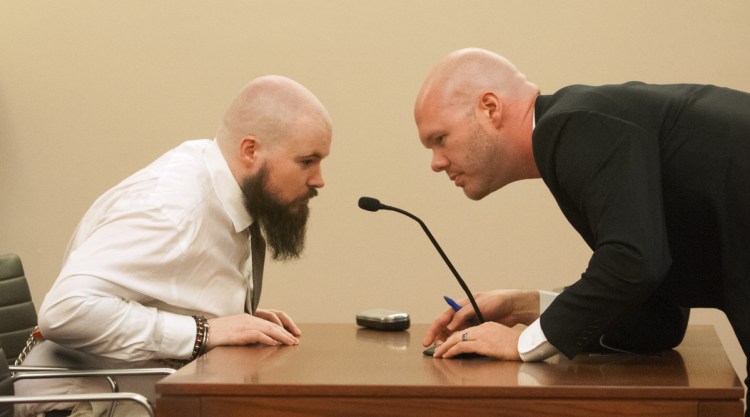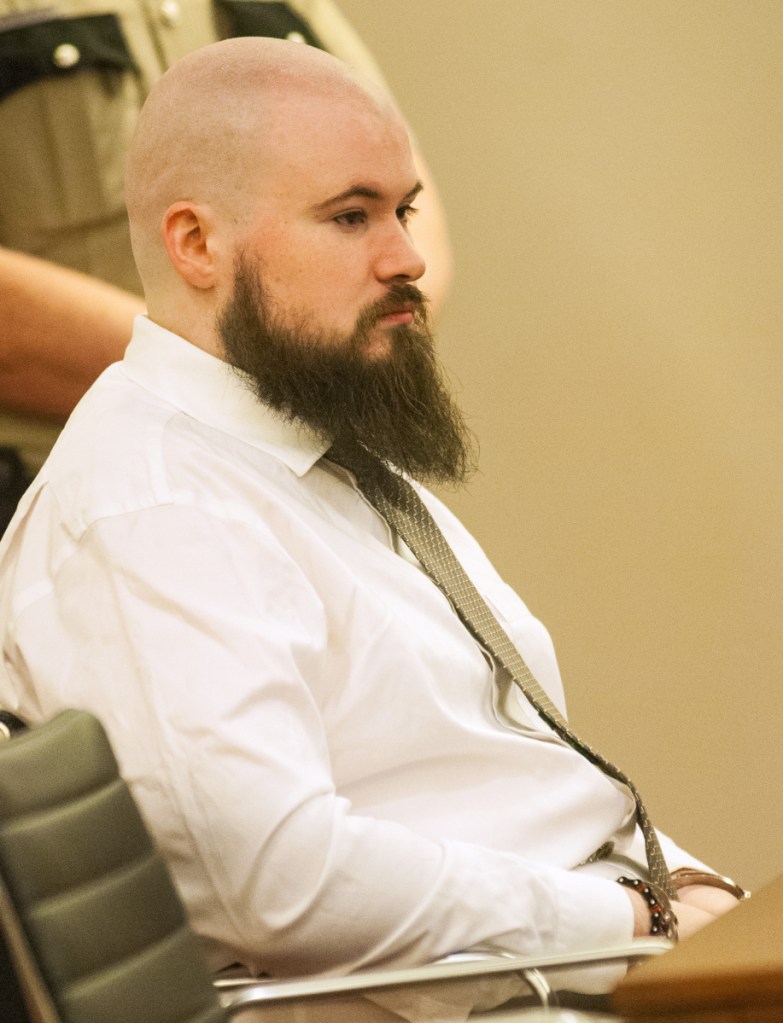AUGUSTA — For the first time since killing and dismembering his father four years ago, Leroy Smith III is eligible for a glimpse of the world outside a state institution.
A judge has approved a request by Smith to be absent from Riverview Psychiatric Center for up to three hours at a time with one-to-one supervision by the hospital staff and with strict conditions.
The order, issued Wednesday and made available in court Thursday, follows a hearing last month at the Capital Judicial Center.
In September 2017, Smith was found not criminally responsible for manslaughter in the slaying of 56-year-old Leroy Smith II on May 3, 2014, in their Gardiner apartment. He was put in the custody of the commission of the Department of Health and Human Services and placed at Riverview for treatment.
The younger Smith, who has been held at the state hospital since several days after the slaying, claimed his father was trying to poison him by putting d-CON in his food, so he had to act first.
Under Justice William Stokes’ order, Smith’s time outside Riverview is “to be implemented incrementally at the discretion” of the Riverview staff.
It limits Smith geographically to a 5-mile radius of the state hospital in Augusta and requires “that prior to any community activities, he must have a careful nursing assessment, particularly focusing on possible presence of any significant anxiety and/or agitation.”
In addition, Smith and any of his belongings “should be thoroughly searched after each community trip,” according to the order.
As with other patients in the custody of the commissioner, Smith must petition the court for changes in the conditions under which he is held, and petitions for may be submitted every six months.
Smith’s attorney, Scott Hess, said Thursday that Smith did not testify at the May 18 hearing. “The State Forensic Service and Riverview were in support of the plan,” Hess said in an email.
Stokes’ order makes it clear that if Smith violates the treatment plan order, flees Riverview or gives probable cause to believe he has committed a crime, the off-grounds privileges are revoked and the violation must be reported within 48 hours to the court, the State Forensic Service, defense counsel and the Office of the Maine Attorney General.
At a January 2016 hearing when he was found incompetent to stand trial, Smith told a judge that his lawyers had failed to represent him properly and that a gun was held to his head in 2011 in an incident somehow involving the heavy metal band Slayer. “I had a gun held against my head and was sworn to keep secret about what I am,” he said, adding, “The whole entire group Slayer was there.” At one point in the case, Smith also claimed to be a political prisoner.
Forensic psychologists have said that Smith was suffering from delusions.
Under a 2015 law, Smith was the first person in Maine to be forced to take psychiatric medication in an effort to restore his mental capacity to be able to participate fully in his defense.
“He has a belief that, starting many years back, that he was destined to be a famous rock star; he was destined to be educated by well-known guitarists,” a clinical psychologist, Peter Donnelly testified in June 2016 at a court hearing.
Donnelly said that Smith has said he is the God of the kingdom of heaven, Icarus, and that at a Phish concert people put a gun to his head, that there was an affiliation with Slayer and Slipknot, both thrash metal bands, and that Smith was warned somehow that his father was going to poison him with rat poison.
However, Donnelly also said at that point, “There’s been an absence of the more grandiose aspects of his delusions since he started his medications.”
Police say Smith stabbed his father to death, dismembered the body and distributed body parts in trash bags in a rural area off Lincoln Street in Richmond.
Smith told police he stabbed his father in the head and neck and then used three knives to “dismember his father” — a Ginsu knife and an Asian-style knife and an unidentified third weapon, according to an affidavit filed in court. The state medical examiner found that the elder Smith was stabbed to death, saying he died of “sharp force trauma,” according to investigators.
Smith was arrested in Westbrook two days after the slaying. He told officers at the Cumberland County jail he had killed his father and “filleted him and buried him in the woods because his dad sexually assaulted him his whole life,” according to an affidavit by Maine State Police Detective Jonah O’Roak. There was no evidence of any sexual assault committed by Smith’s father.
After the insanity plea, one of Smith’s lawyers, Pam Ames, said that even after treatment involving medication, Smith continues to believe his father would have killed him if he had not struck first.
“He knows what he did but has a subjective belief his father tried to kill him with rat poison,” Ames said outside the courtroom. “He honestly felt, in his mind, if he did not kill his father, his father would kill him.”
The elder Smith lived in fear of his son and knew he suffered from mental illness, Assistant Attorney General Donald Macomber said at the time of the plea.
Friends had described the elder Smith as helpful, friendly, and a passionate musician skilled in carpentry and mechanical work, and said he was trying to help his son with his troubles.
Attorneys for both sides agreed early that Smith was legally insane at the time of the slaying. Smith, however, maintained he was not.
Leroy Smith III had been banned in the fall of 2013 from his apartment building in Westborough, Massachusetts, after he started to upset other tenants and the landlord, Westborough police Chief Alan Gordon said shortly after the younger Smith’s arrest in the Maine slaying.
At one point, Smith set his guitar and amplifier on fire in the backyard because “he believed they were emitting evil music,” Gordon said.
The younger Smith was served with a protection from harassment order on Oct. 29, 2013, and violated it a day later, Gordon said. The town’s court issued a warrant for his arrest when Smith failed to show up for his court date.
At some point after the initial protection order was issued, the Secret Service contacted police to say they wanted to question Smith about threats he allegedly made against the president, and Gordon said the FBI had launched an investigation into the allegation.
Gordon said Smith “thought he was God,” a claim he repeated frequently on his Facebook page, which includes a picture of the burned out guitar and amplifier and numerous rambling, profanity-laced entries that describe, among other things, a deep paranoia about the government.
Betty Adams — 621-5631
Twitter: @betadams
Comments are not available on this story.
Send questions/comments to the editors.




